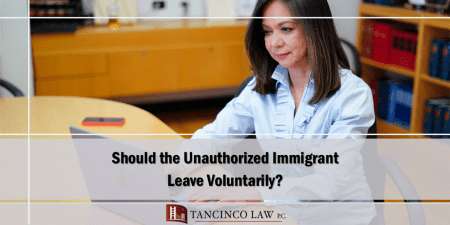San Francisco, CA – With President-elect Trump’s promise of a mass deportation of illegal immigrants, many unauthorized immigrants (including those who have overstayed their visas) are concerned about their future in the United States. While Mexico has 4.1 million unauthorized immigrants, there are approximately 350,000 Filipino immigrants in the U.S. with undocumented status.
Though Trump has pledged to initiate mass deportations on the first day of his term, the details of this policy remain unclear. At present, there are no explicit guidelines on how deportations might be implemented. Based on campaign statements, the following actions are anticipated:
- Use of emergency and executive authorities to bypass existing laws
- Reactivation of the 1798 Alien Enemies Act, which served as the legal basis for the detention of people of Japanese, German, and Italian descent during WWII
- Enlisting local and state police, U.S. military, and the National Guard to enforce immigration laws
According to the American Immigration Council, deporting one million people per year could cost taxpayers an estimated $88 billion annually. Additional resources would be required to increase law enforcement staffing, expand detention facilities, and staff immigration courtrooms, along with the substantial costs of deporting noncitizens via commercial airlines and chartered flights.
During his initial term in 2016, President Trump also discussed mass deportation, yet no more than one million immigrants were deported. Most of those removed were convicted felons or individuals with final orders of removal.
3-10 Year Bar Rule Applies
Choosing to leave the United States voluntarily before a potential mass deportation requires careful consideration of the consequences. The term “voluntary departure” can have different meanings for laypeople and within legal contexts.
In layman’s terms, voluntary departure means leaving the United States independently, such as by taking a flight back to the Philippines. This option is available only if the noncitizen is not currently in removal proceedings. However, there are consequences: even with an approved petition, departing voluntarily can result in a 3-10 year bar on reentry. Specifically, unauthorized immigrants who have been in the U.S. for over six months face a three-year bar, while those who have stayed over one year face a ten-year bar. For families with a mix of U.S. citizens or green card holders and unauthorized immigrants, this could mean separation from family members in the U.S. for three to ten years.
For those in removal proceedings, voluntary departure might allow them to reenter the U.S. later if proceedings were initiated while they were still in status. If they were already out of status, however, a 10-20 year or even a permanent bar may apply depending on the reason for deporation.
In conclusion, voluntary departure has significant immigration consequences, and consulting a licensed legal professional before making such a major decision is essential.
Rights of Unauthorized Immigrants
The U.S. Constitution guarantees due process rights to all residents, meaning that noncitizens may have the opportunity to be heard by an immigration judge before deportation. If detained, unauthorized immigrants may be entitled to a hearing. With a backlog of over three million cases, these hearings may be delayed by months or even years.
Exceptions to the right to a hearing include those who have been in the U.S. for less than two years and are arrested within 100 miles of the border and these group of immigrants may be subject to expedited removal. Most of the 350,000 unauthorized Filipino immigrants have resided in the U.S. for more than two years, and many have lived here for over 20 years.
ICE Raids and Targeted Arrests
With an anticipated increase in interior enforcement, ICE raids are expected to become more frequent during Trump’s administration. Former acting ICE Director Tom Homan noted that raids would not be indiscriminate neighborhood sweeps but rather targeted arrests based on investigative processes.
In a recent NBC interview, President-elect Trump stated that there is no “price tag” for these deportation efforts, emphasizing that the removal of individuals involved in severe crimes is non-negotiable. According to Pew Research, of the 11 million unauthorized immigrants in the U.S., the majority have no criminal record. However, collateral arrests may still occur for those without criminal convictions who are encountered during ICE raids.
Know Your Options and Rights Before Departing
For Filipino nationals who have resided in the U.S. for extended periods, possess strong family ties, and lack criminal convictions, exploring legal options before deciding to leave is advisable. You may still have a right to a hearing where relief, such as a green card, might be possible through immigration courts.
On the other hand, if the prospect of a mass deportation creates anxiety and sleepless nights, you may choose to depart voluntarily—so long as you understand the legal consequences of your decision.
(Atty. Lourdes Tancinco is an immigration attorney and immigrant rights advocate based in the San Francisco Bay area and a partner at the Tancinco Law P.C., law firm established since 1992. She is also a producer/host of Pusong Pinoy sa Amerika, an immigration law informational show aired on GMA Pinoy TV. She may be reached at law@tancinco.com, www.tancinco.com, facebook/tancincolaw, or at 1-888-930-0808)


